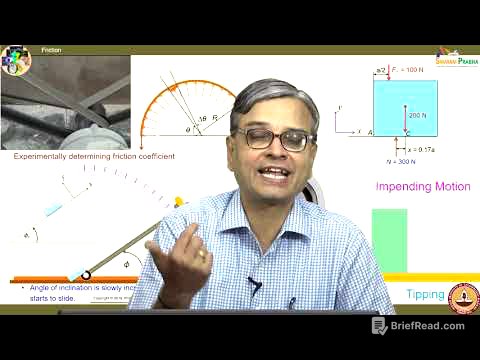TLDR;
This YouTube video features a conversation between Chris Williamson and Dr. K, where they discuss toxic fuel, male anger, the male sedation hypothesis, switching fuel sources, meditation, and the concept of self. They explore how negative emotions can be motivators, the societal pressures on men, and the impact of technology on male behavior. They also touch on the importance of self-discovery, the role of ego, and the challenges of finding purpose and meaning in life.
- Toxic fuel and its impact on motivation
- The transmutation of sadness into anger in men
- The male sedation hypothesis and the role of screens
- Switching fuel sources and the developmental trajectory of motivation
- The importance of meditation and introspection
- The concept of self and the illusion of control
Toxic Fuel Motivates Us [0:00]
Dr. K explains that toxic fuel is using negative emotions like anger, fear, and the need to meet expectations as motivators. While these can drive you to achieve goals, they come at a high cost, leading to burnout and unhappiness. Anger and fear are powerful neurological motivators linked to survival, causing physiological stress with elevated cortisol and adrenaline. This constant state of alert disrupts sleep and overall well-being. People motivated by fear experience extreme relief after achieving their goal but don't feel gratitude or contentment, creating a cycle of stress and temporary relief.
Why Men Go from Sad to Mad [11:29]
Dr. K talks about how men often transmute sadness into anger because society doesn't provide space for male sadness. Sadness and crying are signals for help, but when men express these emotions and don't receive support, they turn to anger as a motivating force. Anger helps them defend their territory and protect themselves. Dr. K also notes that depression can be anger turned inward, especially when people feel they can't express anger towards others. He suggests that when working with angry people, it's important to address the underlying sadness, shame, guilt, and fear.
Are Porn and Video Games Making Men Useless? [22:24]
Chris introduces the "male sedation hypothesis," suggesting that young men are being sedated out of their natural drives for sex and status through screens, porn, and video games. These technologies provide a titrated dose of satisfaction, enough to prevent them from seeking real-world experiences but not enough to make them truly happy. Porn offers sexual gratification, social media provides a sense of community, and video games give achievement and power. This sedation creates a generation of men who are less dangerous but also less useful.
Why We Need Different Fuel at Different Stages [30:16]
Chris brings up the idea of switching fuel sources at different stages of life, using the analogy of a rocket shedding booster rockets as it gains altitude. Toxic fuel, like resentment and the need for validation, can help get you off the launchpad, but it's not sustainable for the long term. Dr. K agrees, noting that people who are despairing often need ego and anger to move forward. He explains that motivation has its own developmental trajectory, with young people often driven by external validation, which can lead to a quarter-life crisis.
The Benefits of Beginning Again [40:09]
Dr. K explains that the second stage of resolving a quarter-life crisis involves physical or mental separation from the old environment. This separation is necessary for self-discovery. He emphasizes that it's developmentally appropriate to feel burnt out and struggle with productivity during this phase. Chris shares his experience of leaving his nightlife business to pursue self-discovery, highlighting the importance of finding alignment between passion and opportunity. Dr. K stresses that the fuel you have doesn't have to manifest in your past industry.
Harnessing the Power of Meditation [50:04]
Chris shares that the answers you're looking for are in the silence you're avoiding. He describes his elaborate morning routine as a form of isolation and monk mode, helping him extract himself from his previous life. Dr. K emphasizes the importance of silence and introspection, noting that spending time with oneself allows suppressed emotions to surface, eventually leading to one's own voice. He recommends practices like meditation to alter the brain and understand oneself.
Why We Should Stretch Ourselves [1:04:18]
Dr. K explains that to transition from external to internal motivation, it's important to make choices, stretch your capacity, and foster relatedness. Making choices, regardless of whether they're right or wrong, activates the part of the brain that exercises agency. Stretching yourself involves actively pushing your limits. Relatedness involves being your authentic self and finding people who accept you for who you are. Chris shares how he made choices to change his training style, read different things, and find a new set of friends.
Does Muscle Mass Lead to Unsuccessful Relationships? [1:17:06]
Dr. K shares research showing that the drive for muscularity is linearly correlated with divorce, suggesting that an obsession with being muscular can negatively impact long-term relationships. He explains that women prioritize safety and security, and a rigid focus on aesthetics can be a turnoff. Chris adds that women are more aroused by a man who helps with household chores. Dr. K emphasizes that it's important to control yourself rather than trying to control your life.
Why are Dad Bods Attractive? [1:33:27]
Chris and Dr. K discuss the attractiveness of "dad bods," noting that women may prefer men who appear less intimidating and more approachable. Dr. K shares that women want to feel safe, and a man who is too focused on his physique may signal rigidity and a lack of focus on the relationship. Chris adds that a dad who is really in shape may be perceived as not dedicating enough effort to his kids.
Are Acts of Kindness Motivated by Toxic Fuel? [1:39:17]
Dr. K explains that doing something for someone you love is not a bad thing, but it becomes problematic when motivated by toxic fuel like guilt or shame. He distinguishes this from being a "simp," which involves seeking validation through acts of kindness. Chris shares his experience of questioning whether his actions were genuine or motivated by a need for approval. Dr. K emphasizes that doing something for your spouse is only a problem if it's not reciprocated.
Sl*t-Shaming and Simp-Shaming are Mostly Intrasexual [1:48:55]
Chris introduces a game theory perspective on slt-shaming and simp-shaming, suggesting that these behaviors are primarily intrasexual, meaning they come from within the same sex. He argues that slt-shaming is a price enforcement mechanism for sex, used by women to raise the price of sex so it doesn't drop below a level that most women are happy with. Similarly, simp-shaming is used by men to prevent other men from giving away commitment and resources without sex, which devalues those resources for other men.
Why We Use Boundaries as Protection [1:59:21]
Dr. K explains that red pill ideology often stems from trauma, with individuals becoming emotionally divested to protect themselves from getting hurt again. This can lead to transactional relationships and a reinforcement of negative worldviews. He emphasizes that red pill techniques often target people with a history of trauma and anxious attachment styles.
How Do Men and Women Differ in Relationships? [2:07:42]
Dr. K discusses the differences in what leads to female and male arousal, noting that men are often DTF (down to f*ck) while women need to feel safe and secure. He explains that the first stage of sexual arousal is to be in a no-stress state, and a clean home can be a prerequisite for sexual activity for women. Dr. K also highlights the emotional labor that men do in relationships, particularly emotional containment.
What Makes Grooms Cry? [2:17:46]
Chris asks about the phenomenon of grooms crying at weddings, specifically at the moment when they see their partner walking down the aisle. Dr. K explains that it's a culmination of emotions, a moment where everything becomes real. He notes that there's a lot of pressure on men to perform, and crying can be a signal for help when emotions become overwhelming.
ChatGPT Tells You What You Want to Hear [2:22:36]
Dr. K expresses concerns about people using ChatGPT as therapists, explaining that AI is trained on the internet and doesn't know how to discriminate between good and bad information. He notes that ChatGPT rates the quality of its responses based on user satisfaction, leading to a tendency to tell people what they want to hear. This can reinforce negative beliefs and lead to online radicalization.
How to Find Your True Self [2:30:50]
Chris and Dr. K discuss the concept of self, with Dr. K arguing that the truest version of yourself is that which experiences your life. He explains that all the attributes of your life, like being a man or a doctor, are just actions and experiences. Dr. K recommends meditation as a way to find pure awareness, free from thoughts and emotions. He emphasizes that the self is empty, allowing you to intentionally reprogram yourself.
Chris’ Journey With His Sense of Self [2:45:01]
Chris shares his personal experience with health challenges that impacted his ability to articulate words, which struck at his sense of self. He realized that he had wrapped a lot of his identity up in being a good talker. Dr. K emphasizes that ego is something we get attached to, but it comes with a price. He encourages responding to the environment without the burden of identity.
Where to Find Dr K [2:51:07]
Dr. K shares that if people want to understand themselves, they should check out Dr. K's guide. He built it after going through 300 patient charts. He looked at what is the most effective stuff that he taught these people and he put that together for things like depression, ADHD, anxiety.








